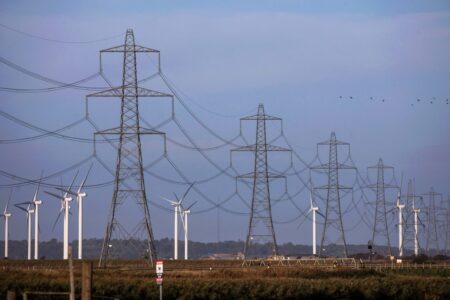
Of the 14 “Grand Challenges of Engineering” identified by the National Academy of Engineering, six are in the environmental and ecological engineering domain. These six challenges address critical issues like providing access to clean water, restoring and improving our infrastructure in a sustainable way, and developing methods to capture and store carbon dioxide emissions.
Solving these complex problems requires environmental and ecological engineers to possess a unique blend of advanced knowledge and skills. Because these challenges are multifaceted, a purely scientific background isn’t enough.
Instead, an advanced degree is required. This way, graduates can apply the full range of technical expertise in systems engineering, biology, and chemistry to protect human and environmental health, design sustainable systems, and manage Earth’s resources for future generations.
At these leading universities, you can pursue those advanced degrees in environmental and ecological engineering, equipping you with the tools and expertise needed to tackle these pressing challenges:

Purdue’s EEE programme is flexible and designed to develop the careers of students. Source: Purdue University
Purdue University
Environmental issues pose some of the most pressing challenges facing our planet. Purdue University’s Environmental and Ecological Engineering (EEE) programme equips graduates with the skills to address these issues head-on. Ranked #12 for graduate programmes by US News & World Report (2023), Purdue EEE takes a holistic approach, training future engineers to consider environmental and ecological aspects when designing solutions.
Purdue EEE offers MS, PhD, and combined degrees that allow graduates to develop sustainable solutions for various issues, from clean water and air to waste management and resource conservation. The curriculum goes beyond traditional environmental engineering by covering industrial sustainability — designing systems that minimise waste and maximise resource efficiency. This two-pronged approach reflects Purdue EEE’s commitment to true sustainability, addressing existing environmental problems while preventing future ones.
The EEE MS programme, which can be completed in three semesters, fosters interdisciplinary collaboration, drawing students across STEM fields. With 21 faculty members appointed across seven departments across the University, the programme offers an unparalleled breadth of knowledge. As such, students benefit from diverse perspectives which helps them to develop well-rounded problem-solving skills.
Purdue EEE understands that career prospects are important. This is why it works hard to maintain their 100% internship or independent project completion rate before graduation, ensuring graduates are job-ready. Environmental engineers are in high demand, ranking #2 on US News & World Report’s 2024 Best Engineering Jobs list with a median salary of US$96,530 (2022). Purdue EEE graduates are top contenders for these roles, with many going on to make significant contributions in various sectors like consulting, manufacturing, government, NGOs, and academia.
Diversity is another strength of the programme. With a student body and faculty of roughly 55% women year-over-year and students from over 14 countries, Purdue EEE cultivates a welcoming and inclusive environment for all.

A master’s degree in Ecological and Environmental Sciences at Imperial College London opens doors to various career paths, including PhD pursuits, roles in conservation NGOs, and multinational corporations. Source: Imperial College London
Imperial College London
Imperial College London is a global top 10 university with a world-class reputation for excellence in teaching and research. In 2022, it was named “University of the Year” by The Times and Sunday Times Good University Guide. Here, you’ll find an educational experience in ecological and environmental sciences like no other that equips students with the knowledge and skills to tackle critical environmental issues.
Their master’s programmes, including MSc Environmental Engineering, MSc Conservation Science and Practice and more, are based at Silwood Park, a vibrant rural campus with diverse natural habitats. Upon arrival, you’ll go on a week-long field trip, immersing yourself in the ecosystems that you’ll be studying.
Silwood Park has cutting-edge facilities, from the Wolfson Genomics Laboratory for advanced DNA sequencing to state-of-the-art microbe labs. You can even get hands-on with pond mesocosms, giant controlled “ponds” that simulate real-world ecosystems.
Studying here places you within a thriving community of passionate students. You’ll follow in the footsteps of groundbreaking researchers who made significant contributions to ecology and environmental science, including the foundation of disease modelling and chaos theory. As a master’s student, you’ll be part of this dynamic research culture, actively participating in practicals and potentially contributing to ongoing projects. This could involve animal surveys, collecting soil samples, or computer coding to solve environmental challenges. You might even contribute to ongoing research, like Ecology, Evolution and Conservation programme students who track Lundy Island’s sparrow population.
The master’s programme culminates in a unique student conference, where you’ll present your research — an invaluable experience for a scientific career. Beyond academia, graduates go on to diverse fields, with many joining conservation organisations or taking on roles with environmental consultancies and carbon restoration companies. Others have secured positions with multinationals like JP Morgan and Hitachi.

The Environmental Engineering programme at ETH Zürich attracts technically-minded students passionate about environmental and climate issues. Source: ETH Zürich/Facebook
ETH Zürich
Nestled amidst breathtaking Alpine vistas, ETH Zurich, ranked sixth globally, offers a unique learning experience for over 23,000 international students. This university goes beyond traditional education whose sole purpose is to only prepare for a job. Instead, the university designs and runs interdisciplinary programmes that tackle pressing global issues like climate change.
The Institute for Environmental Engineering (IfU) exemplifies this commitment. Here, renowned researchers focus on developing sustainable solutions for environmental challenges. Their work in areas like water management, air quality, and ecological systems have won global recognition.
These are the same people who teach the Environmental Engineering programme, which caters to technically inclined students passionate about environmental and climate issues. The curriculum is continuously updated, reflecting the dynamic nature of environmental challenges. This ensures graduates are well-equipped to tackle real-world problems, whether in engineering firms, government agencies, or pursuing scientific careers.
Master’s students can choose a specialisation, such as urban water management, environmental technologies, resource management, water resources management, and river and hydraulic engineering. What’s more, a wide range of electives from ETH Zurich and the University of Zurich allows for further specialisation or a broader educational scope. The programme culminates in a master’s thesis to test and showcase research capabilities.
Beyond the classroom, the Environment and Computer Laboratory provides hands-on experience in technical methodologies. Students refine their experimental techniques and gain expertise in software applications crucial for environmental analysis. While internships aren’t mandatory, the programme strongly encourages them to bridge the gap between theory and professional practice.
*Some of the institutions featured in this article are commercial partners of Study International










